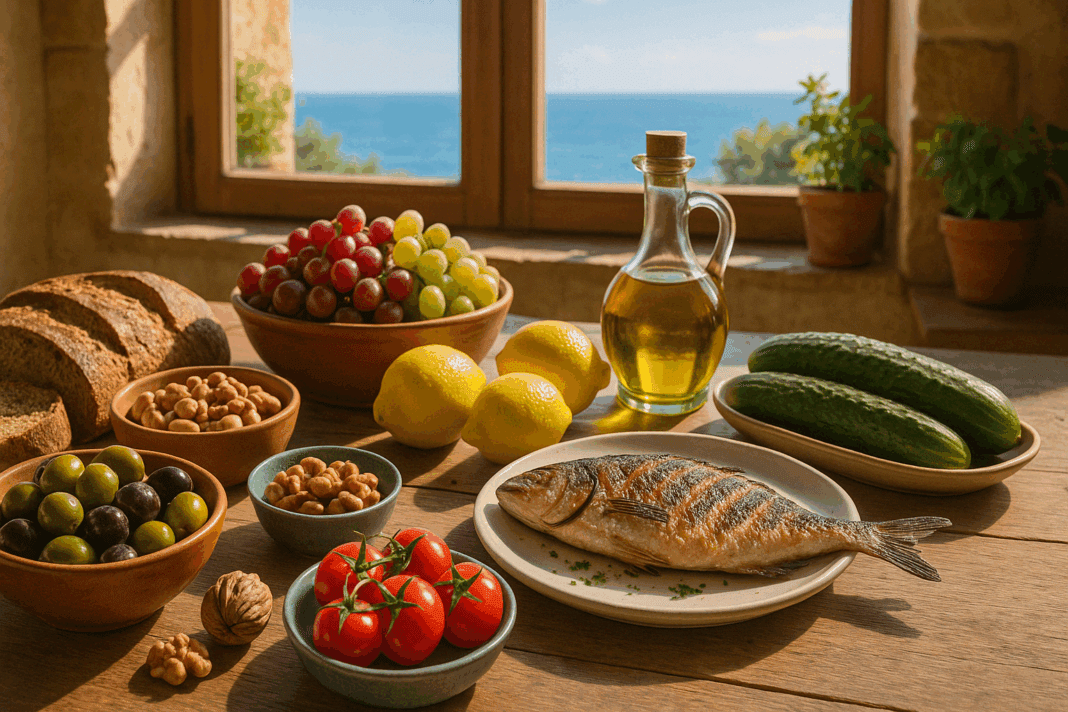In the ever-expanding world of weight loss advice, the Mediterranean diet stands out as a sustainable, delicious, and evidence-based approach to health and nutrition. Rooted in the traditional eating habits of countries bordering the Mediterranean Sea, this diet doesn’t just help people lose weight—it enhances overall well-being, reduces the risk of chronic disease, and nurtures a long-term relationship with food. But how do you start a Mediterranean diet for weight loss in a way that’s realistic and effective? With the right knowledge, tools, and expert-backed strategies, it’s easier than you think to embrace this lifestyle and begin your journey toward a healthier you.
Unlike extreme dieting regimens that eliminate entire food groups or rely on rigid calorie counting, the Mediterranean diet emphasizes natural, whole foods and encourages mindful eating. Its flexible structure means it can be personalized to your preferences and nutritional needs while supporting gradual and lasting weight loss. Through this guide, we’ll explore what the Mediterranean diet consists of, how to build a Mediterranean diet food list, which foods support your goals, and how to create a Mediterranean diet meal plan that fits your daily routine.
You may also like: How a Whole Foods Diet Supports Sustainable Weight Loss: Expert Tips for Eating Whole Foods to Lose Weight Safely
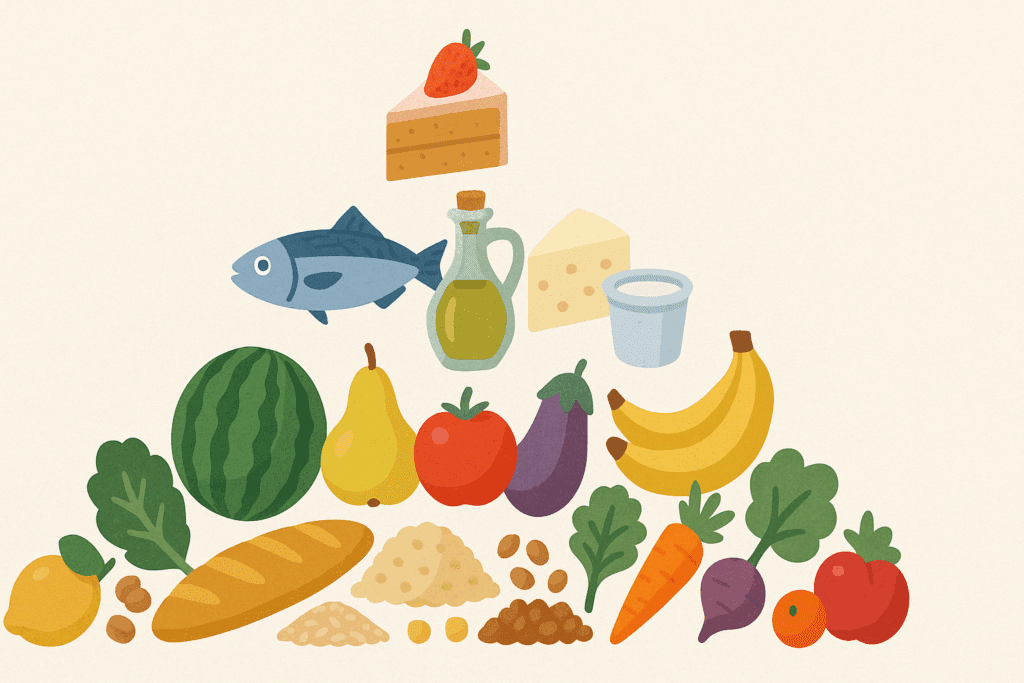
What Does the Mediterranean Diet Consist Of?
At its core, the Mediterranean diet is a pattern of eating that reflects the culinary traditions of countries like Greece, Italy, Spain, and southern France. But it’s not just about geography—it’s about prioritizing foods that support your body and honoring how you eat. So, what does the Mediterranean diet consist of? The foundation includes vegetables, fruits, whole grains, legumes, nuts, seeds, and healthy fats such as olive oil. These foods are consumed daily, forming the bulk of every meal.
In moderation, the diet includes seafood and fish like sardines, anchovies, and salmon. Yes, for those asking, is salmon included in the Mediterranean diet? Absolutely—it’s rich in omega-3 fatty acids and protein, making it a cornerstone of many Mediterranean dishes. Dairy products like Greek yogurt and traditional cheeses are also eaten a few times per week, while red meat and sweets are limited to occasional indulgences.
The Mediterranean pyramid food structure illustrates this well: plants form the base, followed by seafood and dairy in smaller amounts, and minimal processed foods at the top. The goal is to create balance and variety while minimizing added sugars, refined grains, and trans fats. In this way, the Mediterranean diet supports both metabolic health and emotional satisfaction.
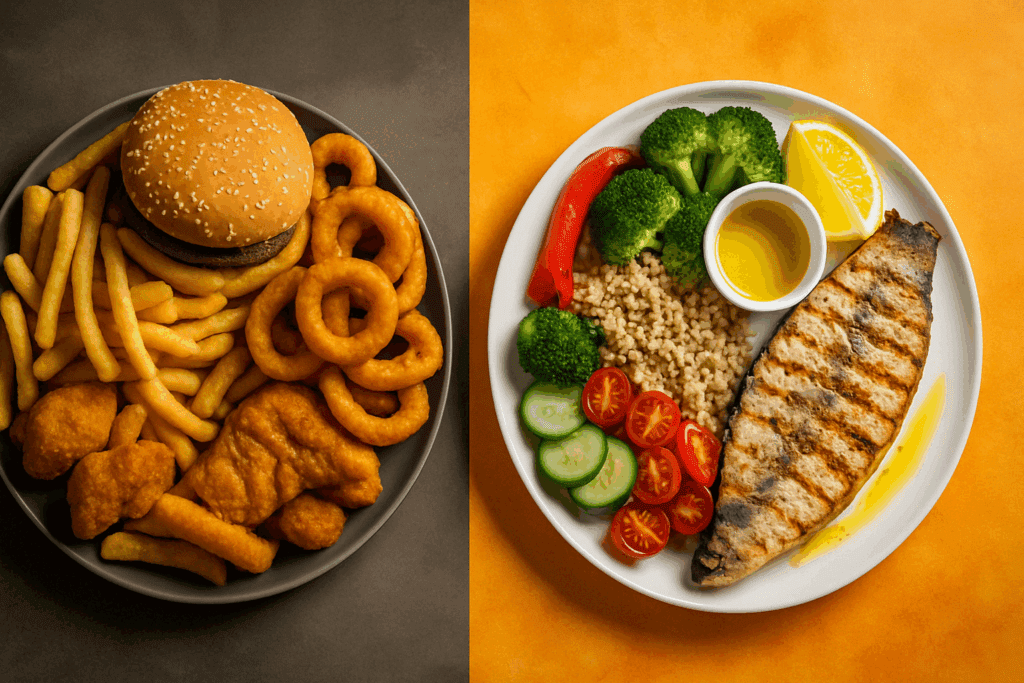
Why the Mediterranean Diet Works for Weight Loss
There’s a compelling reason that nutritionists and physicians consistently recommend the Mediterranean diet for weight loss. It works with your body, not against it. The high fiber content from legumes, vegetables, and whole grains helps keep you full longer, reducing the need for mindless snacking. Unlike restrictive diets that can lead to nutrient deficiencies, the Mediterranean diet offers a wide array of vitamins, minerals, and phytonutrients.
One of the key benefits of Mediterranean diet patterns is their anti-inflammatory effect. Chronic inflammation is linked to obesity, insulin resistance, and metabolic syndrome. By focusing on natural foods rich in antioxidants—like fruits, olive oil, nuts, and fatty fish—the Mediterranean diet helps combat this inflammation while promoting fat loss and better energy balance.
Protein plays an important role too. High-quality Mediterranean diet protein sources include fish, legumes, eggs, and dairy. These foods support lean muscle mass and satiety, both crucial for effective weight loss. This combination of slow-digesting carbs, healthy fats, and lean protein stabilizes blood sugar, reduces cravings, and naturally limits calorie intake without the need for deprivation.

Creating Your Mediterranean Diet Food List
A smart, well-organized Mediterranean diet food list makes it easier to make healthy choices day after day. When crafting your grocery list, think about whole foods with minimal processing and maximal nutrition. Start with vegetables like tomatoes, leafy greens, zucchini, eggplant, cucumbers, and bell peppers. These foods are rich in fiber, water, and phytonutrients that support weight loss and digestive health.
Don’t forget the fruits of the Mediterranean, which include grapes, oranges, lemons, figs, dates, pomegranates, and apricots. These fruits not only taste great but offer antioxidants, vitamins C and A, and natural sugars that curb sweet cravings in a healthy way. Aim to include fruits on Mediterranean diet menus daily, as snacks or added to salads and breakfasts.
Whole grains like farro, quinoa, brown rice, barley, and bulgur make excellent staples. These are complex carbohydrates that digest slowly and support sustained energy throughout the day. Legumes—such as chickpeas, lentils, and cannellini beans—should also make frequent appearances, offering both fiber and plant-based protein.
Don’t overlook quality fats. Olive oil is central to Mediterranean cuisine and is rich in heart-protective monounsaturated fats. Nuts and seeds such as almonds, pistachios, and sunflower seeds add crunch and satisfaction to meals. Your Mediterranean grocery list should also include seafood like tuna, sardines, and of course, salmon.
Dairy options like low-fat Greek yogurt, feta, and Parmesan are common. Many ask how often to eat Greek yogurt Mediterranean diet style? The recommendation is several times per week, in small portions, to provide probiotics, calcium, and protein. And for those allergic to or avoiding peanuts, peanut butter alternative Mediterranean diet options include tahini (sesame paste) or almond butter.
What Can You Eat on the Mediterranean Diet?
The answer to what can you eat on the Mediterranean diet is refreshingly simple: real, nourishing food. You can enjoy a vast variety of fruits, vegetables, grains, legumes, nuts, seeds, herbs, and seafood. Meals are typically seasoned with lemon juice, garlic, oregano, rosemary, and fresh basil rather than sauces filled with sugar and preservatives.
Is celery on the Mediterranean diet? While it may not be featured prominently in traditional recipes, celery absolutely fits the Mediterranean approach and can be included in salads, stews, and soups. Similarly, eggs on Mediterranean diet menus are common, especially in dishes like frittatas or poached eggs over greens.
Cheese is included as well, but always in moderation. Mediterranean diet cheese tends to be tangy, flavorful, and used sparingly—feta, ricotta, and kefalotyri are just a few examples. Rather than loading a dish with cheese, you use it as a flavorful accent.
Your Mediterranean food list can be as creative as you want it to be. With so many naturally plant-forward dishes—like grilled vegetable platters, white bean soups, lentil salads, and citrus-marinated seafood—you’ll find meals that are satisfying without relying on heavy sauces or added sugars.
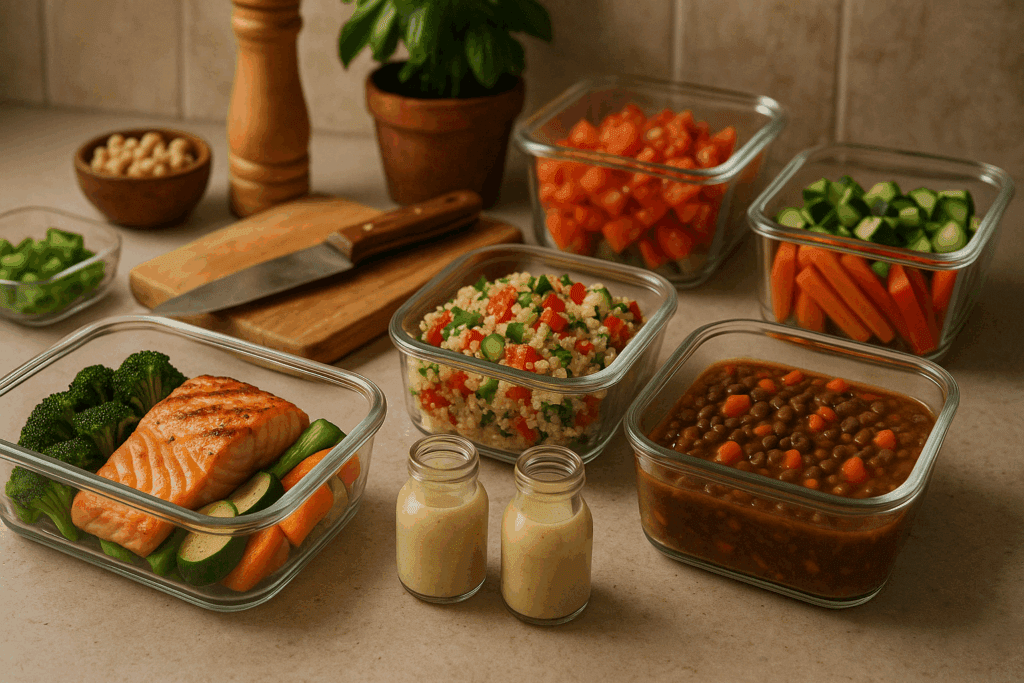
Easy Meal Planning and Prep Tips
Having a go-to Mediterranean diet meal plan makes it easier to stick with your goals. A typical day might begin with Greek yogurt topped with sliced figs and walnuts, a drizzle of honey, and a dusting of cinnamon. For lunch, consider a lentil and arugula salad with grilled eggplant, red onion, and a lemon-olive oil vinaigrette. Dinner could include grilled salmon with a farro and roasted vegetable medley.
Batch cooking a few ingredients can simplify your week. That’s where Mediterranean diet meal prep becomes invaluable. Roast a large tray of vegetables, cook a big pot of lentils or quinoa, and prepare a jar of lemon-tahini dressing. These components can be mixed and matched for lunches and dinners.
If your goal is weight management, a weight loss meal prep Mediterranean diet strategy helps control portions and ensures you have nutrient-dense meals ready to go. It also eliminates the guesswork, reducing the chances of resorting to less healthy convenience foods. Your Mediterranean shopping list should always include versatile items that can be used in multiple meals.
Even with busy schedules, prepping simple ingredients like hard-boiled eggs, chopped veggies, and cooked grains allows for quick assembly. A hearty chickpea stew or tuna salad with white beans and herbs can come together in minutes when your fridge is stocked.
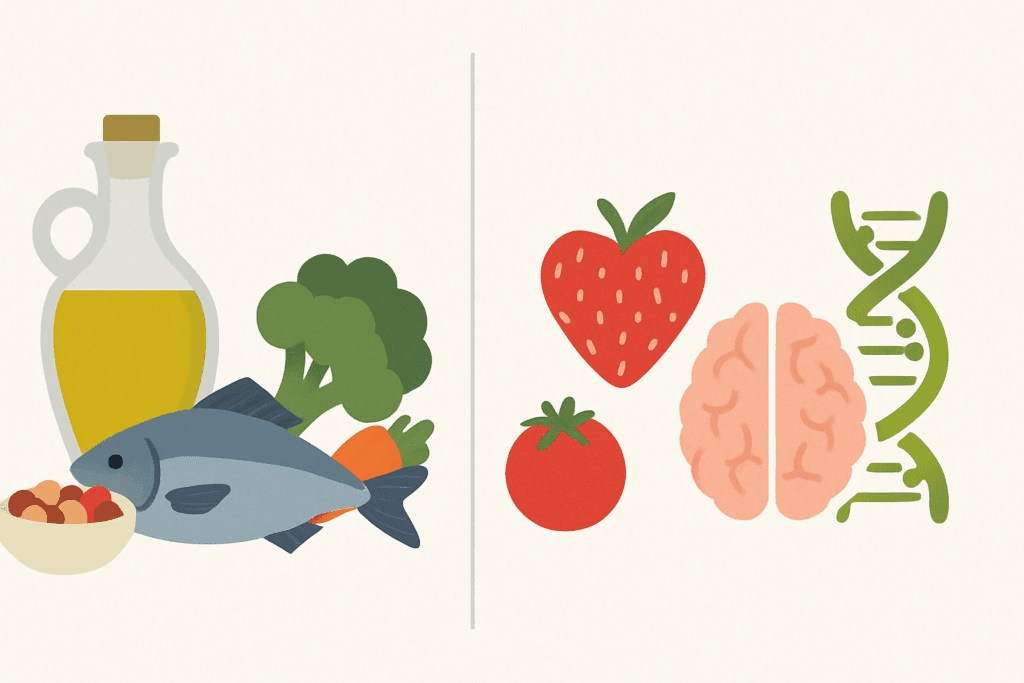
Is Mediterranean Food Healthy?
Let’s address the common question: is Mediterranean food healthy? Without question, yes. One of the most powerful aspects of this diet is that it’s supported by decades of scientific research. Its effects on weight loss, heart health, and cognitive function have been well-documented in studies across diverse populations. Whether your goal is to lose weight or simply improve your health, is the Mediterranean diet healthy enough to deliver results? Absolutely.
The emphasis on fresh, whole foods and the avoidance of processed items lowers your intake of added sugars, unhealthy fats, and excess sodium. The Mediterranean diet health benefits extend to improved cholesterol levels, better blood sugar control, and reduced risk of stroke and cardiovascular disease. It’s also associated with longevity and reduced rates of depression and cognitive decline.
This is not a trend but a proven, long-standing way of eating that offers real benefits. The inclusion of anti-inflammatory fats, fiber-rich carbs, and nutrient-dense foods contributes to hormonal balance, energy, and mental clarity—key components of long-term weight loss and overall vitality.
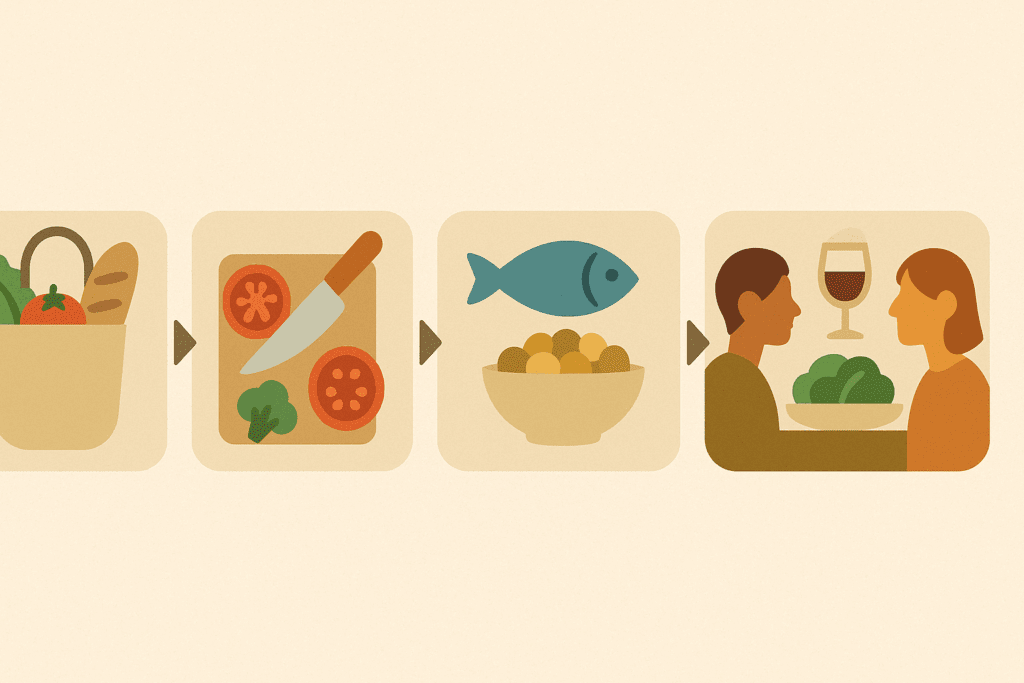
Frequently Asked Questions (FAQ): Starting and Sustaining a Mediterranean Diet for Weight Loss
1. Can the Mediterranean diet support long-term weight maintenance after initial weight loss?
Yes, one of the most overlooked benefits of the Mediterranean diet is its ability to support long-term weight maintenance. Unlike restrictive diets that often lead to rebound weight gain, the Mediterranean approach promotes sustainable eating behaviors by focusing on satiety, nutrient density, and lifestyle integration. A well-balanced Mediterranean diet meal plan encourages intuitive eating, which fosters a better relationship with food. Because it includes a variety of satisfying ingredients like legumes, whole grains, and Mediterranean diet protein sources, it naturally discourages overeating. By regularly revisiting your Mediterranean food list and updating your Mediterranean diet shopping list with seasonal items, you can continue to maintain your weight loss while enjoying diverse meals.
2. How does cultural background influence adherence to a Mediterranean diet?
Cultural familiarity with the Mediterranean diet can significantly enhance compliance and enjoyment, but even those outside the Mediterranean region can adopt its core principles. Food rituals, family-style eating, and social mealtimes—all part of the traditional lifestyle—encourage slower, more mindful eating. For individuals from non-Mediterranean backgrounds, adapting the Mediterranean meal plan might involve incorporating regional produce into dishes or combining familiar spices with Mediterranean diet ideas like lentil stews or grilled vegetable platters. The flexibility of the Mediterranean pyramid food model allows cultural adaptation while maintaining nutritional integrity. Sharing meals and cooking with others can reinforce adherence regardless of your culinary roots.
3. Are there any overlooked plant-based proteins in the Mediterranean diet?
Absolutely. While chickpeas and lentils are often emphasized, there are several underutilized plant-based Mediterranean diet protein options that deserve more attention. Lupini beans, for example, are popular in Southern European regions and offer a high-protein, low-carb snack that fits seamlessly into the Mediterranean diet food list. Another valuable but lesser-known source is freekeh, a roasted young wheat grain that combines fiber and protein. Pairing these with Mediterranean diet meal prep strategies, like prepping them in bulk and adding to salads or soups, helps boost nutrient intake without relying solely on seafood or dairy. Including a wider variety of legumes also enhances the microbiome, another indirect contributor to weight regulation.
4. How can the Mediterranean diet be adapted for individuals with nut allergies?
For those with nut allergies, the Mediterranean diet still offers abundant options without sacrificing nutritional quality. While nuts like almonds and walnuts are frequently found on a Mediterranean grocery list, seeds such as sunflower, pumpkin, flax, and chia can serve as excellent alternatives. A high-quality peanut butter alternative Mediterranean diet adherent might use tahini (made from sesame seeds) or seed-based spreads. These provide healthy fats, fiber, and micronutrients without triggering allergic responses. It’s also important to incorporate omega-3-rich seafood like sardines and salmon, which offer the same cardiovascular and anti-inflammatory benefits that nuts provide in the traditional plan.
5. Can I follow a Mediterranean diet without eating seafood?
Yes, though seafood is central to the diet’s traditional form, a modified Mediterranean diet can still be healthy and effective for weight loss. For those wondering is salmon included in the Mediterranean diet, it certainly is—but it’s not mandatory. By focusing on legumes, eggs, and dairy as Mediterranean diet protein alternatives, you can build a complete Mediterranean diet meal plan without fish. Plant-based sources like lentils, tempeh, and Greek yogurt (consumed several times a week according to how often to eat Greek yogurt Mediterranean diet guidance) can also fill this gap. However, be mindful to include other omega-3 sources like flax or chia seeds and consider fortified foods or supplements if avoiding all seafood.
6. How can grocery shopping be optimized for Mediterranean diet adherence?
Creating a dynamic and functional Mediterranean shopping list is essential for consistency. Begin by mapping meals for the week, focusing on recipes that include overlapping ingredients—like tomatoes used in soups, sauces, and salads. Organize your Mediterranean diet shopping list by category: produce, grains, proteins, and pantry staples. For instance, keeping tahini, olives, capers, and canned chickpeas on hand can help build meals quickly. Seasonal adjustments to your fruits of the Mediterranean and vegetables ensure better flavor, cost savings, and nutritional variety. Reviewing your Mediterranean diet food list regularly allows you to try new ingredients and avoid repetition, keeping the diet enjoyable and practical.
7. Are there any Mediterranean diet ideas for those with a busy lifestyle?
Busy schedules don’t have to sabotage your goals. A strategic weight loss meal prep Mediterranean diet approach involves prepping two to three base ingredients weekly, such as roasted vegetables, cooked grains, and a legume-based salad. With these, you can create grain bowls, wraps, or warm meals with minimal effort. Consider investing in storage containers and labeling meals by day to streamline your week. Smoothies featuring fruits on Mediterranean diet menus like figs, berries, and citrus make for excellent portable breakfasts. Batch-cooked egg frittatas with spinach and feta are another quick, nutrient-dense meal—proof that even eggs on Mediterranean diet menus can be convenient.
8. How does the Mediterranean diet benefit mental health and cognitive function?
Beyond weight loss, one of the most intriguing benefits of Mediterranean diet adherence is its positive impact on mental clarity and mood stability. Studies suggest that the anti-inflammatory nature of the diet—rich in antioxidants, omega-3s, and fiber—may reduce symptoms of depression and protect against cognitive decline. Including foods from your Mediterranean food list that are high in polyphenols, such as olives, red grapes, and herbs like oregano, can support brain health. Additionally, slow meals and social eating practices, common in Mediterranean diet ideas, contribute to stress reduction and better emotional resilience. This emotional balance further reinforces healthier food decisions and long-term weight maintenance.
9. Can the Mediterranean diet support blood sugar balance in individuals with prediabetes?
Yes, one of the often-overlooked Mediterranean diet health benefits is its capacity to stabilize blood sugar—especially valuable for individuals with insulin resistance or prediabetes. Its emphasis on low-glycemic foods, such as legumes, non-starchy vegetables, and whole grains, helps prevent blood sugar spikes. When building your Mediterranean meal plan, opt for slow-digesting carbs like barley or quinoa and pair them with protein and healthy fat. Include fiber-rich ingredients such as artichokes and celery on the Mediterranean diet to slow digestion further. With consistent Mediterranean diet meal prep, it’s possible to maintain stable energy levels and reduce the risk of type 2 diabetes while also promoting fat loss.
10. What’s a good way to gradually start a Mediterranean diet without feeling overwhelmed?
The most effective approach to how to start a Mediterranean diet is to begin with small, manageable changes. Replace refined oils with extra virgin olive oil, swap white bread for whole grain pita, and gradually increase the number of vegetables at each meal. Use your Mediterranean diet shopping list to introduce one or two new foods each week—perhaps starting with fruits on Mediterranean diet menus like pomegranates or dates. Focus on mastering one Mediterranean diet meal prep recipe at a time, such as a lentil soup or grilled vegetable bowl. Over time, these habits build a solid foundation that supports not only weight loss but also enjoyment and longevity in your food choices.
Conclusion: Embrace the Mediterranean Way for Lifelong Wellness and Weight Loss
Adopting the Mediterranean lifestyle isn’t just a dietary shift—it’s a profound commitment to better health, mindful nourishment, and sustainable weight management. By understanding what does the Mediterranean diet consist of, using a strategic Mediterranean grocery list, and embracing flavorful whole foods, you set yourself up for success not just for a month—but for life.
Whether you’re drawn to the antioxidant-rich fruits of the Mediterranean, the satiety of Mediterranean diet protein, or the creative meal options on a Mediterranean diet food list, there is room for personalization and enjoyment. Every choice you make—from swapping butter for olive oil to savoring Greek yogurt with fresh fruit—moves you closer to your wellness goals.
Remember, starting a Mediterranean diet for weight loss doesn’t mean overhauling everything overnight. Begin with small, consistent steps: plan a few Mediterranean diet meal prep ideas for the week, experiment with new vegetables and herbs, and focus on how food makes you feel. Pay attention to your body, your energy, and your progress.
This isn’t about perfection—it’s about nourishment, pleasure, and balance. The Mediterranean way encourages a joyful relationship with food and provides the framework for lasting health. As you begin your journey, let your plate be filled not just with nutritious meals, but with intention, mindfulness, and care. With every bite, you’re investing in a healthier, lighter, and more vibrant life.
Was this article helpful? Don’t let it stop with you. Share it right now with someone who needs to see it—whether it’s a friend, a colleague, or your whole network. And if staying ahead on this topic matters to you, subscribe to this publication for the most up-to-date information. You’ll get the latest insights delivered straight to you—no searching, no missing out.
Further Reading:
7-Day Mediterranean Diet Meal Plan for Beginners, Created by a Dietitian
A complete guide to the Mediterranean diet
Disclaimer
The information contained in this article is provided for general informational purposes only and is not intended to serve as medical, legal, or professional advice. While NewsHealthWatch strives to present accurate, up-to-date, and reliable content, no warranty or guarantee, expressed or implied, is made regarding the completeness, accuracy, or adequacy of the information provided. Readers are strongly advised to seek the guidance of a qualified healthcare provider or other relevant professionals before acting on any information contained in this article. NewsHealthWatch, its authors, editors, and contributors expressly disclaim any liability for any damages, losses, or consequences arising directly or indirectly from the use, interpretation, or reliance on any information presented herein. The views and opinions expressed in this article are those of the author(s) and do not necessarily reflect the official policies or positions of NewsHealthWatch.

